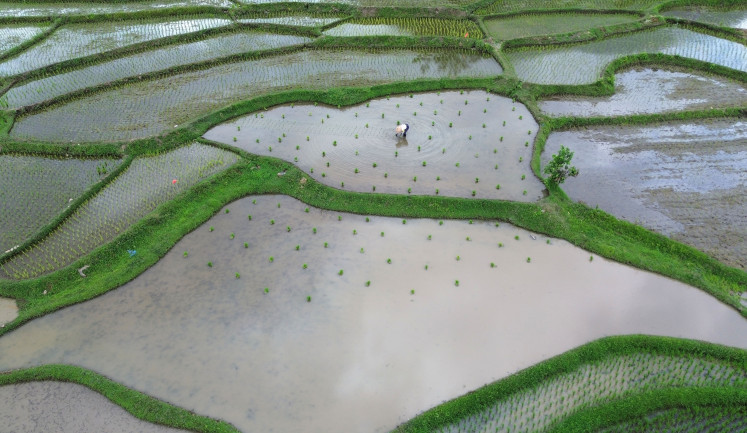Popular Reads
Top Results
Can't find what you're looking for?
View all search resultsPopular Reads
Top Results
Can't find what you're looking for?
View all search resultsStep in the right direction
The message from one of the country’s biggest Islamic organizations, Muhammadiyah, that forgoing mudik is part of a “humanitarian jihad” in the “test of faith” that is the pandemic will take some getting used to, and much persuasion.
Change text size
Gift Premium Articles
to Anyone
 Passengers board the Gajayana train, which serves a route between Malang, East Java, and Jakarta, at Kota Baru Station. State-owned railway company PT KAI has suspended operations of the train until April 30 to comply with government's instruction on limiting travel to slow the spread of COVID-19. (JP/Aman Rochman)
Passengers board the Gajayana train, which serves a route between Malang, East Java, and Jakarta, at Kota Baru Station. State-owned railway company PT KAI has suspended operations of the train until April 30 to comply with government's instruction on limiting travel to slow the spread of COVID-19. (JP/Aman Rochman)
W
hat is concerning about COVID-19 is that we may not know how widespread it truly is. The National Development Planning Agency (Bappenas) and the University of Indonesia estimated that the number of infections in Indonesia would reach a chilling 2.5 million by the end of April in the absence of strong intervention.
It is of great relief, therefore, that President Joko “Jokowi” Widodo announced a ban on the annual mudik (exodus) starting Friday, when the Ramadan fasting month is expected to start. The threat of the virus has finally resulted in a decision that prioritizes health and safety over business.
However, prior to the ban, thousands of people began traveling home, mostly from Greater Jakarta, the nation’s epicenter of the pandemic. They “only” comprise an estimated 7 percent of the people who usually return home for mudik, according to a survey by the Transportation Ministry that Jokowi cited.
Earlier, the governors of West and Central Java pointed to a spike in local cases traced to arrivals from elsewhere. In the absence of a government policy, they had pleaded for people not to return home “if you really love your parents”.
Yet, urban workers who had lost income continued to exit the capital. Thus, the presidential order is better late than never. Last year, 20 million joined the exodus, including 15 million from Greater Jakarta.
Read also: 'I need to protect my family': Jakartans nix homecoming trips following COVID-19 'mudik' ban Violators of the mudik ban may face a maximum sentence of one year in prison and a Rp 100 million (US$6,472) fine may await, in accordance with Law No. 6/2018 on health quarantine. Details of the sanctions are being drafted and will be ready soon, but it is better to prevent any violations from happening in the first place by accelerating the delivery of social assistance to those in need.
President Jokowi had earlier resisted calls to ban mudik, prompting businesses, local authorities and religious organizations to simply discourage travel. Only civil servants, military and police personnel and employees of state-owned companies were explicitly prohibited from traveling home.
In Indonesia, the world’s biggest predominantly Muslim country, the annual mudik is a strong tradition that, as in other nations, makes urbanites’ lives away from their families more bearable. As with Christmas or Chinese New Year, going home, even if it requires a long and grueling and costly journey, is part of the identity of those who strive to maintain their roots.
After a month of mandatory fasting, the Idul Fitri homecoming celebrations are also part of traditions to ask for forgiveness from parents and elders.
This is why not going home goes against instinct. The message from one of the country’s biggest Islamic organizations, Muhammadiyah, that forgoing mudik is part of a “humanitarian jihad” in the “test of faith” that is the pandemic will take some getting used to, and much persuasion.
Technology will help a little to save the day, however painful the process is. “Kangen, vidcall”, reads a banner in front of a residential area in Yogyakarta. Its translation? “When missing your family, video call”.









